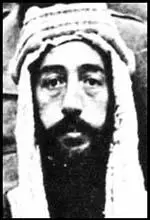King Faisal I

Faisal, third son of Emir Hussein, the son of Sharif Husain of Mecca, was born in 1885. Faisal lived in Constantinople and later sat in the Ottoman parliament as deputy for Jidda.
During the First World War Faisal served with the Turkish Army. In 1916 he changed sides and began working closely with T. E. Lawrence. He became the leading Arab military commander and led the troops into Damascus on 3rd October 1918.
Prince Faisal attended Paris Peace Conference with Lawrence of Arabia. He had meetings with Felix Frankfurter. His assistant, Ella Winter, recalled in her autobiography, And Not to Yield (1963): "The young, beautiful Prince Feisal was always followed by his group of tall, imposing, silent Arabs in long white robes and head dress, and by his shadow, Colonel T. E. Lawrence, also in native dress. Lawrence was short and fragile-looking, with a delicate, poetic face, but he appeared as much at home with the desert Bedouins and the prince he seemed so attached to as with European diplomats. Felix was as much intrigued by Lawrence's role in all the Middle Eastern politics as with his romantic appearance."
On 10th March 1920 declared himself the King of Syria and Palestine. When he was deposed four months later by the French the British authorities agreed that he could become King of Iraq. He took office on 23rd August 1921. The Kurds in the north of the country were unhappy with this arrangement and were involved in several uprisings against his rule.
The British mandate for Iraq came to an end in October, 1932 and Iraq now entered the League of Nations as an independent state. However, Britain bound Iraq closely to the British Empire by a 25 year military alliance. Britain retained military bases in Iraq and exerted a strong political influence in the country. This included ensuring that the concession for oil exploration and exploitation to the Iraq Petroleum Company, a conglomerate of British, French and United States interests.
During the 1930s there were seven military coups. These all failed but the king's rule came to an end when he was killed in a car accident in 1939. He was then replaced by his son Faisal II.
© John Simkin, April 2013
Primary Sources
(1) First Source
Text
© John Simkin, April 2013
